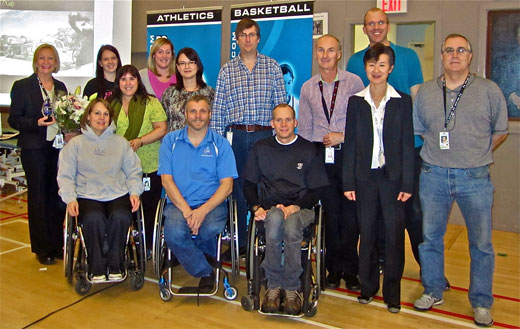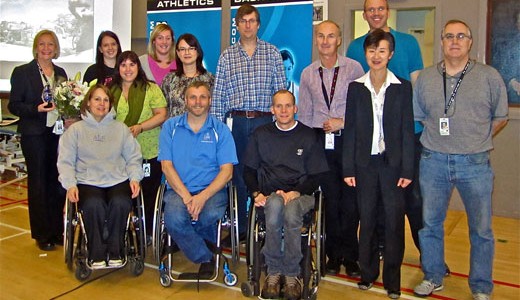G.F. Strong team recognized for contribution to wheelchair sports

Front row (l to r): Marni Abbott-Peter,coach/sport consultant; Adam Frost, wheelchair rugby coach,
BCWSA; James Hustvedt, athletics coach, BCWSA. Middle row (l to r): Debbie Pugh, recreation therapist; Lara Heller, recreation therapist; Scott Dirom, clinical practice leader, recreation; Chris Palmer, PSM, outpatient programs/specialized clinical services; Carol Chao, PSM, inpatient programs; Mark Houlden, recreation programmer. Back row (l to r): Annette Lange, operations director, rehab, arthritis, spine and neurosciences; Lisa Myers, assistant programs coordinator, BCWSA; Kim Gorrell, recreation therapist; Peter Fornelli, physiotherapist.
“I probably didn’t realize what it was going to mean to me,” Tristan Smyth admits of his introduction to wheelchair sports while undergoing rehab for a broken back. “Because G.F. Strong provided those opportunities, it helped me feel good about myself; it gave me a lot of purpose.”
Tristan’s story — and countless others like it — are the reason the Canadian Wheelchair Sports Association has honoured the G.F. Strong Rehabilitation Centre and its staff with the Rick Hansen Award. This award recognizes inspirational contributions to the growth and development of wheelchair sports in Canada.
Now a member of the national development team for wheelchair track and road racing, Tristan recently completed his first wheelchair marathon.
G.F. Strong-BCWSA partnership makes B.C. a leader ![image_112252[1]](http://vchnews.vch.ca/wp-content/uploads/2012/11/image_11225211.jpg)
“B.C. is very much a leader in wheelchair sports, and it’s because of G. F. Strong,” says Holly Tawse of the B.C. Wheelchair Sports Association (BCWSA), which nominated the centre.
Hundreds of people are active in wheelchair sports leagues around the province at any time. According to the BCWSA nomination, “Without G.F. Strong’s support, countless athletes with a disability, from the recreational to the Paralympic level, would likely not have gotten their start in wheelchair sports.”
Congratulating the G.F. Strong team, Annette Lange, operations director, rehab, arthritis, spine and neurosciences, noted that “promoting better health in our communities is one our True North goals. This award is a reflection of how G.F. Strong’s recreational therapy staff work collectively and collaboratively with the BCSWA to make a meaningful difference in the lives of British Columbians.”
“It’s nice to see such a big organization validate the importance of my job and why I’m here,” says Kim Gorrell, a recreation therapist at the centre.
Involvement offers physical, social and emotional benefits
“Often clients who’ve sustained a life-altering event, like a spinal cord injury, lose their social connections to friends they had before their injury. Sports is a great outlet, especially for the social side of things – connecting, developing peer relationships, getting into the community,” Kim explains.
Peter Isherwood of Vancouver was always athletic, so when a mountain biking accident left him a C-5 quadriplegic, he embraced wheelchair sports. “It mentally made me feel ‘normal,’ for lack of a better word,” he says. “I was able to do things with other people, be involved, meet people, be competitive again. Especially once you’re out of the rehab hospital, it helps you meet other people with disabilities who are leading fulfilling lives.
“You just grow – you become more confident, more independent, and stronger mentally and physically.”

